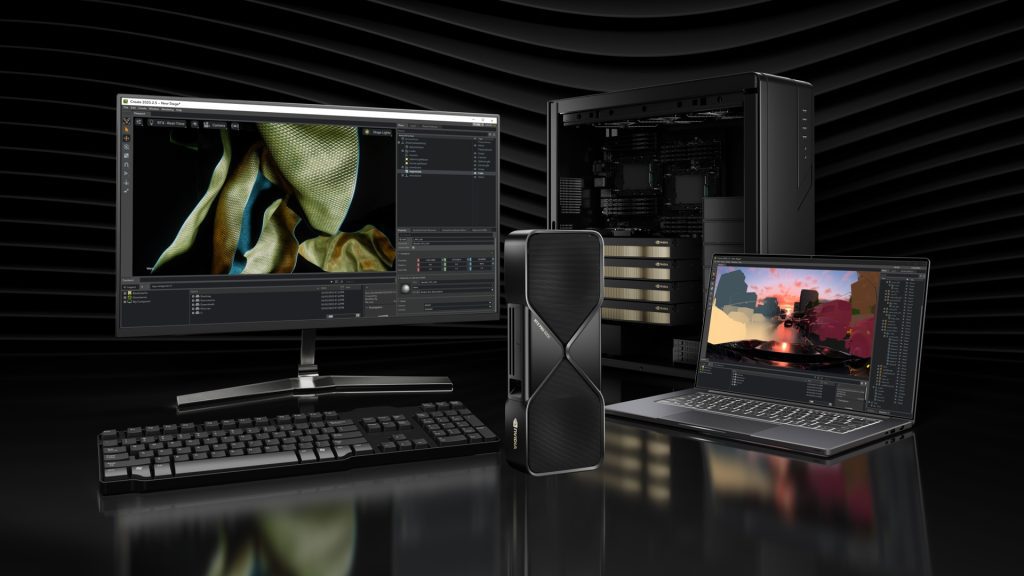Revolutionary AI and Graphics Innovations Transform Visualization and Computing Worldwide
GTC—NVIDIA has unveiled the NVIDIA RTX PRO™ Blackwell series, a groundbreaking line of workstation and server GPUs that is set to change the workflow landscape for professionals in AI, technical fields, creative industries, engineering, and design. This new generation introduces cutting-edge accelerated computing, AI inference, ray tracing, and neural rendering technologies.
The RTX PRO Blackwell series empowers professionals across various sectors—ranging from autonomous robots, vehicles, extended reality, and complex 3D designs, to simulations and AI development—by providing unmatched computational power, memory capacity, and data transfer capabilities. This is accessible from desktop setups, mobile workstations, or high-performance data center GPUs.
The newly launched series comprises:
- Data center GPU: NVIDIA RTX PRO 6000 Blackwell Server Edition
- Desktop GPUs: NVIDIA RTX PRO 6000 Blackwell Workstation Edition, NVIDIA RTX PRO 6000 Blackwell Max-Q Workstation Edition, NVIDIA RTX PRO 5000 Blackwell, NVIDIA RTX PRO 4500 Blackwell, and NVIDIA RTX PRO 4000 Blackwell
- Laptop GPUs: NVIDIA RTX PRO 5000 Blackwell, NVIDIA RTX PRO 4000 Blackwell, NVIDIA RTX PRO 3000 Blackwell, NVIDIA RTX PRO 2000 Blackwell, NVIDIA RTX PRO 1000 Blackwell, and NVIDIA RTX PRO 500 Blackwell
Bob Pette, NVIDIA’s vice president of enterprise platforms, emphasized the necessity for robust AI and graphics performance for software developers, data scientists, artists, designers, and engineers to address significant industrial challenges. According to Pette, the introduction of NVIDIA Blackwell will elevate productivity, performance, and speed significantly, enhancing AI inference serving, data visualization, and content creation.
Key Features of NVIDIA Blackwell Technology for Workstations and Data Centers
The RTX PRO Blackwell GPUs harness the power of generative, agentic, and physical AI to deliver superior performance, efficiency, and scalability.
The NVIDIA RTX PRO Blackwell GPUs boast:
- NVIDIA Streaming Multiprocessor: Offers up to 1.5x faster throughput and introduces neural shaders that bring AI integration into programmable shaders, propelling the next wave of AI-enhanced graphics innovations.
- Fourth-Generation RT Cores: Provides up to double the performance of the prior generation, creating photorealistic, physically accurate scenes while optimizing for NVIDIA RTX™ Mega Geometry.
- Fifth-Generation Tensor Cores: Achieves up to 4,000 AI trillion operations per second and adds support for FP4 precision, enabling groundbreaking AI-driven graphics and faster prototyping of larger AI models.
- Enhanced GDDR7 Memory: Increases capacity and bandwidth with up to 96GB for workstations and servers, and 24GB for laptops, enabling efficient handling of larger, complex datasets.
- Ninth-Generation NVIDIA NVENC: Speeds up video encoding and enhances quality for professional video tasks, with new support for 4:2:2 encoding.
- Improved PCIe Gen 5: Doubles data transfer bandwidth from the previous generation, optimizing performance for data-intensive operations.
- DisplayPort 2.1: Supports high-resolution displays at up to 4K 480Hz and 8K 165Hz, facilitating seamless multi-monitor setups and superior color accuracy.
- Multi-Instance GPU (MIG): Segments a single GPU into multiple instances for the RTX PRO 6000 data center and desktop GPUs, enhancing secure and efficient resource management.
The new laptop GPUs also incorporate advanced NVIDIA Blackwell Max-Q technologies to optimize performance and power consumption dynamically using AI. With capabilities for neural rendering and AI-assisted tools, the RTX PRO Blackwell GPUs enable rapid creation of mesmerizing visuals, digital twins of real-world settings, and immersive experiences with unprecedented efficiency.
Engineered for enterprise-grade data centers, the RTX PRO 6000 Blackwell Server Edition features a thermal design that operates passively and can support configurations with up to eight GPUs, catering to the dense compute requirements needed for AI, scientific, and visual computing applications across various industries like healthcare, manufacturing, and media.



